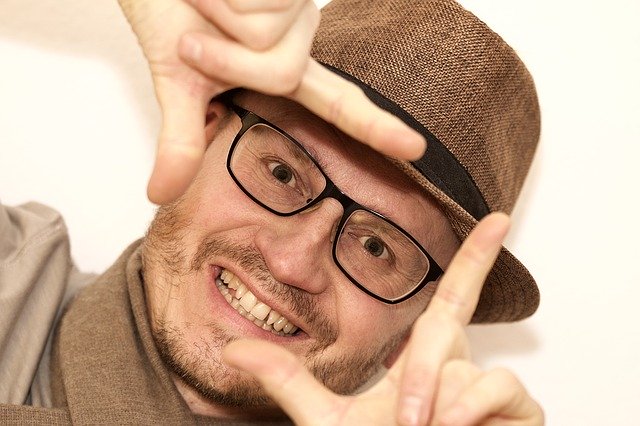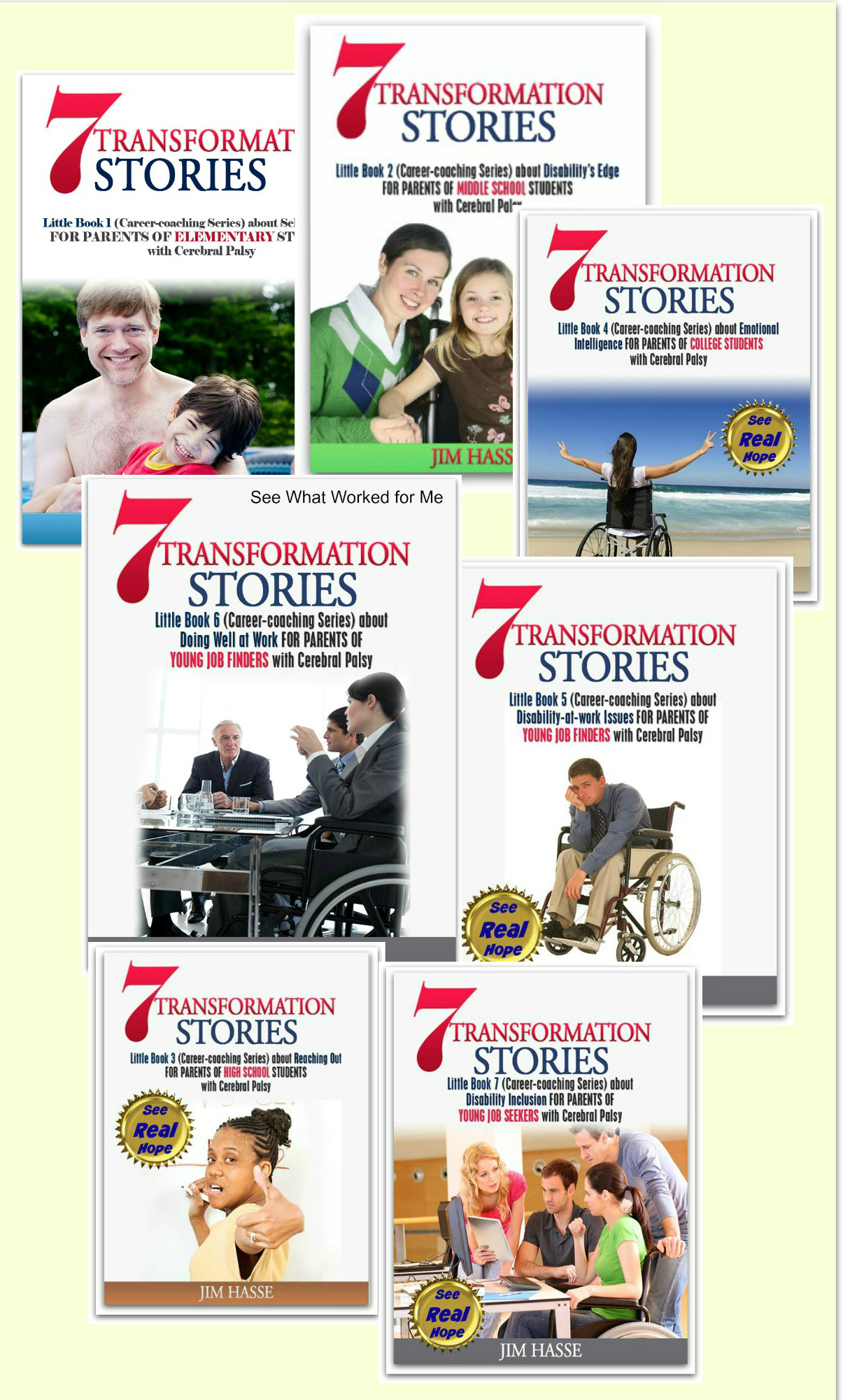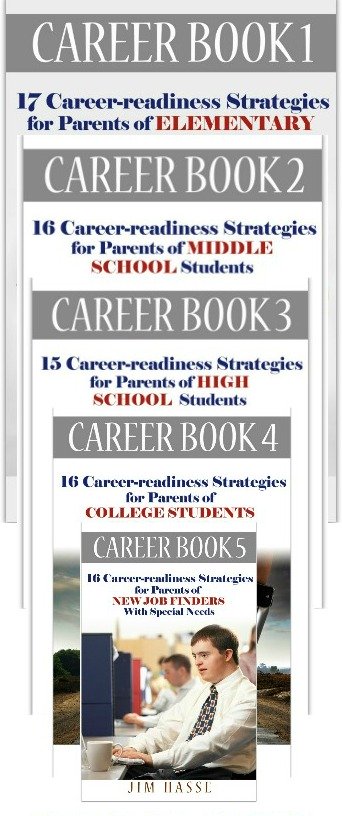Communication Skill Builders: Cerebral Palsy Career Builder for Job Seekers
By Jim Hasse, ABC, GCDF, Disability Employment Expert
_________________________________________________________
I have identified seven communication skill builders that, together, can actually become a career management template for your new job seeker with cerebral palsy (CP) who seeks to frame his or her disability as a competitive edge in today’s job market.
Let me put these seven concepts into context so, as a career-coaching parent, counselor or mentor, you can help your young man or woman frame personal disability in ways that will resonate well with hiring managers.
For years, I’ve been grappling with ways to show hiring managers that the skills I’ve learned in effectively handling the various aspects of CP make me a job candidate they need to seriously consider in their hiring decisions.
I now know I was searching for a series of communication
skill builders that individuals need to effectively tap in order to authentically
communicate with their potential bosses.
In September 2011, I attended a “Dealing with Trauma”
presentation author and speaker Gary
Karp made to a group of graduate students who are studying to be physical
therapists at the University of Wisconsin-Madison. Since then, I’ve been making
notes about how I would guide recent college graduates with CP who are now in
the market for jobs. How can they come up with their own “disability frame of
reference” as they prepare for their entry into the job market?
Thank you, Gary, for sparking my interest in helping
people with CP define what disability means to them and laying out some of
these potential communication skill builders for the individuals who coach them.

Seven ways to frame disability
Here are the communication skill builders I have so far: adaptability, self-confidence, self-advocacy, potential, freedom, self-determination and gratification – communication platforms I would suggest new job seekers with CP consider as they develop their job marketing programs.
Please massage and add and substrate as you, in coaching your man or woman, see fit. I’m the first to admit that communication skill builders, such as these seven ways to frame disability, are always in the process of “becoming.”
Adaptability
Like most students (with
and without CP), you most likely will find for yourself that you are capable of
going beyond of what you first imagine you can do. In fact, you may find
yourself eventually doing what you first thought was impossible. And, you may
discover what it’s like to be what people like to call “courageous,” which most
commonly means facing a difficulty without fear.
What you’ll more likely discover is that courage is actually learning how to
handle fear so you’ll be able to figure out how to work around your CP. In
other words, people in general are very adaptable. You are living proof of that
bit of good news, and you’ll be surprised how friends, acquaintances and
strangers will be genuinely grateful to you for simply being a living example
of that good news.
Remember that you are neither “heroic” nor “pathetic” as a person with CP. In
dealing with your CP, you’ll probably fall somewhere in the middle of those two
extremes: simply “effective” or “adaptive.” Shun “tragic” or “inspirational” as
descriptors of your situation in life.
In my own case, I learned that illustrating adaptability was one my key
communication skill builders. For example, I learned how to delegate authority
early in my career to people reporting directly to me as well as to co-workers
who could benefit from a little increased responsibility, visibility and
recognition.
How is your
youngster’s
constructive approach to disability
paving the way to a successful school-to-work transition?
Join PACER’s Facebook
discussion.
I took courses about how to delegate well and found that effective delegation
not only strengthened my team but also demonstrated my people management skills
to my superiors and coworkers, who became less reluctant to delegate
effectively in their own jobs. It was one of the key reasons I became a vice
president, even though I had CP and walked and talked with difficulty.
Self-confidence
Encourage others to be honest about your CP by showing them you can handle
honesty about yourself and your capabilities as well as your limitations.
Anger, denial, and depression are all natural ways of coping with both a
lifelong and acquired disability, but still using your CP as a scapegoat along your
journey toward acceptance of your personal vulnerabilities is a distraction. It
hinders the development of your self-confidence.
I have found that showing self-confidence has been one of my most important communication skill builders.
I credit my mom with showing me that dwelling on what I could not change in terms of my capability was a waste of time. Instead, even in grade school, I concentrated on what I thought was possible: learning shorthand so I could take notes, learning to use the keyboard etc.
Those little successes helped me build my self-confidence and eventually work around obstacles I, at first, thought I could not overcome.
Self-advocacy
In today’s society, you
need to advocate for yourself as a person with CP. No one will do it for you
(or at least as good as you can do it for yourself).
Again, my mother modeled what self-advocacy could become for me. I flunked
first grade in a rural, one-room school house, so she taught me first grade
herself. Then, she found her way around state government service offerings and
gained help from key people in various agencies for placing me in an orthopedic
grade school 60 miles from our home farm.
That break-through put me on the path to independence.
Potential
Remember to be kind to yourself. How you want to handle your CP may not always be how you actually react to it in real life, and that’s acceptable. After all, you’re human. As communication skill builders, your failures show you what is possible in your life. They reveal your potential.
As a person with CP, you learn to celebrate what is possible instead of what you never had or what you lost and once had. Continually mourning an incapability or a loss is like dragging around old baggage. It’s actually a pathology not associated with your disability.
Even in sixth grade, I knew I wanted to be a writer. But, I remember long nights when I had a theme to write for a next-day high school class and was writing it laboriously in long-hand because I didn’t yet know how to use a manual typewriter.
But, it was just a matter of taking one step at a time to become a writer. Those steps included going to a “regular” high school back home, finding an accessible college which offered journalism, getting good grades, finding my niche in the real work world etc.
Freedom
You are not “confined”
by your disability but feel “liberated” by assistive technology that, for
instance, provides power chairs for mobility, tablets for quick access to the
Internet and Communication Access Real-time Translation for hearing. That’s a type
of freedom.
You know that assistive technology has not advanced to the point where you can
instantly disappear in one room and reappear in another, so you don’t have to
dwell on that possibility and how convenient and cool that would be. It’s not
yet possible. You don’t miss it because you can’t do it. That’s another kind of
freedom.
So, you don’t dwell on what is not possible and what you don’t miss. Instead, you
focus on real possibilities. Getting that concept across to people without a
disability is sometimes difficult, but it’s another key concept in this array of communication skill
builders.
Assistive technology can be relatively simple. At least, it was in the 1960s. One of my first liberating moments occurred when I started college and mobility between classes became an important issue for me.
I always enjoyed providing the motor power for classmates who used wheelchairs while in grade school because the wheelchair also gave me stability and balance. So, I bought a grocery cart from a local supermarket, placed my books inside the cart and started pushing it between classes at college, leaving it outside (rain or shine) each building while I attended classes inside.
I tagged the cart with this sign: “This is the property of Jim Hasse. Please do
not move.” It was always there when my classes were done and I needed it to get back to my
dorm.
That was one my first successes in establishing a communication skill builder.
Self-determination
Treasure people and situations which offer you options because choices, such as the option of obtaining the type of help when you need it on your own terms, is the hallmark of self-determination and independence.
Gaining an understanding from others about what self-determination means to you is often difficult. It's one of the most illusive communication skill builders.
I’m forever grateful to my employer of 29 years for refusing to limit me to work that others would usually assume I could and could not do. I felt empowered.
Gratification
Document the skills you
learn from living well with CP and practice telling stories about how you
developed them and how they relate to the workplace. Those anecdotes will come
in handy for showing prospective employers how your disability experience has
prepared you for enhancing their bottom lines.
In doing so, you may discover that you are surprisingly gratified by the
unusual opportunities you’ve had because of your disability experience.
I know I wouldn’t be the person I am today without my experiences of battling
(and thriving) with my CP. Through the people I met while attending my
orthopedic grade school, for instance, I’ve had the opportunity to travel in Africa,
Russia and Europe.
Summarizing my disability framework
So, after thinking about this series of communication skills builders and personalizing it for my own benefit, here’s how I would put my disability into a context for todays’ prospective employers.
“By learning to live well with my disability, I have learned how to work around obstacles.
“Creating my own work-around solutions to real as well as perceived problems has strengthened my adaptability, my self-confidence, my self-determination and my independence – attributes that make me a team player as well as an innovator."
What you can do as a mentor
You can go through the same exercise with the job seeker you are mentoring. Help your young man or woman with CP build his or her own framework for disability through a series of communication skills builders.
Your
job seeker needs to personalize his or her communication skill builders, using each
as an opportunity to tell prospective hiring managers a story about how he or
she can work with “disability savvy” and contribute to the bottom line.
How is your
youngster’s
constructive approach to disability
paving the way to a successful school-to-work transition?
Join PACER’s Facebook
discussion.
Return
from Communication Skill Builders
to Cerebral Palsy Career Builders
This is Creative Commons content. You can freely and legally use, share and repurpose it for non-commercial purposes only, provided you attach this sentence and the following attribution to it (including the two links):
Originally written and illustrated by Jim Hasse, ABC, GCDF, owner of Hasse Communication Counseling, LLC, who, as a person with cerebral palsy, served for 10 years as a vice president in a Fortune 500 company during his 29-year career in corporate communication. He’s an Accredited Business Communicator, certified as a Global Career Development Facilitator and author of 14 Amazon books about disability awareness and disability employment issues.





